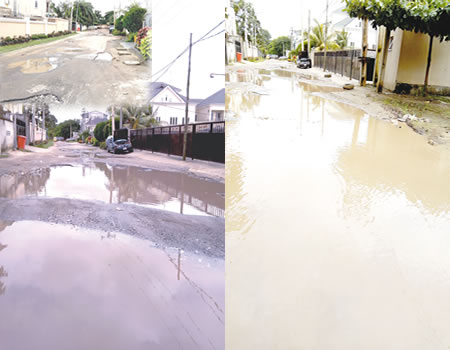
It is now almost at par in status with high-class areas in Lagos State like Lekki, Victoria Island, Victoria Garden City, Ikoyi and Magodo.
Findings showed that outright purchase of buildings – three, four and five-bedroom flats – in Ikeja GRA starts from N100 million. The rent also varies. A three-bedroom flat is said to go for N6.5 million and above, depending on the street, while a five-bedroom flat attracts N8 million a year, also depending on the street.
In terms of beauty and serenity, Ikeja GRA is like Lekki. But the former also shares an ugly side with the latter – flooding. The causes of the problem, however, are different. While the flooding situation in Lekki has been linked to the area’s closeness to the ocean’s coastline, lack of basic infrastructure, especially drainage channels, is Ikeja GRA’s major undoing. Due to the absence of drainage system on most of the streets, whenever it rains, the majority of the residents have a hard time travelling on the roads. Some simply stay indoors and wait for the flood waters to recede.
During a recent visit to Ikeja GRA, Saturday Tribune observed that only three areas – Oduduwa Crescent, Joel Odumakin and Isaac John Streets – have functional drainage systems. Obasa Street was seen with what appeared to be a one-sided drainage system. It was observed that each of Remi Fani-Kayode, Ladoke Akintola, Arinola Coker, Oba Akinjobi, Oba Dosumu, Ladejobi and Esugbaye streets were either without a drainage system at all or a working drainage system which could ease the flow of water whenever it rains. Remi Fani-Kayode and Esugbaye streets are mostly affected. They appear to be suffering from neglect as rain waters occupied both areas.
A commercial tricycle rider, one Mr Francis, who showed Saturday Tribune correspondents to all the streets in Ikeja GRA, said he and his fellow riders always avoided the area whenever there was a heavy rain. “We always avoid this place whenever there is a persistent rain, because the road that links Ikeja to the GRA, Oba Akinjobi Street, is always flooded. If we try to use the road during such a period, our engines end up getting damaged and that is very bad for business,” he said.
Also Read: https://tribuneonlineng.com/flooding-toes-lagos-assembly-tells-commissioner/
Also, a worker at a construction site in Esugbaye who only gave his name as Segun said the flooded road was slowing down activity at the site. “You can see for yourselves. The road is bad. You can see water everywhere, even though it only rained slightly yesterday and this morning,” he said.
Asked if persistent rainfall caused the houses there to be flooded, a gatekeeper on Esugbaye Street said, “That does not happen at all. We actually don’t have that problem. But sometimes when there is a persistent downpour, the water enters the compound but goes away immediately the rain stops. The problem is non-availability of a drainage system. Isaac John Street also went through the same situation a few years back, but after several complaints, government constructed a drainage system. The place became okay and has since not had the problem of water remaining on the road after the rain has stopped.”
A worker at Isaac John Street, who was approached by Saturday Tribune, wondered why a place like Ikeja GRA would still have parts without drainage system. “Solving the problem here is simple; let them construct drainage. I wonder where they expect rain water to go if not on the roads. Even at Oba Akinjobi Street, where a hospital, Area F Police Command and the high court are situated, you still can’t find a drainage system, let alone inner streets like Esugbaye,” he said.
A resident at Oduduwa Crescent asked the state government to do the needful to complement the good work it had been doing. “Give it to the Lagos State government, they are trying. But not having a drainage system in this area is not good. Ikeja GRA shouldn’t be a place where you will find water, overgrown grasses on the street. Government needs to construct a good drainage system in the GRA. Without that, we will keep witnessing what we have in Esugbaye and other areas that have flood on the streets. Streets like Esugbaye are bad only because the water has no place to go and you can see that it is already damaging the recently-constructed roads.”
Effects on businesses
A staff member of Canan Dental Clinic on Sasegbon Street, who refused to disclose his name, said the street hardly got affected by flooding. “Though some areas in Ikeja GRA suffer mild flooding whenever it rains, we here are not affected as those who first inhabited this place took that into consideration before developing it. We should know that the white people (foreigners) were those who first mainly inhabited this place years back and every house they lived in had a place where water from rain usually goes into. I think those who later bought it from them also continued with it, even after demolishing the old structure and building a new one. We have never witnessed flooding since the clinic was built two years ago. Residential areas like Esugbayi and Fani-Kayode Street may be affected but there is nothing like that here. The builders planned it well, as we have soakaway for human waste and for water coming from the rain,” the person said.
Also, a staff member of Nurture Zone Creche Pre-school, on Ayoola Coker Street who gave his name simply as Mohammed, said heavy downpour usually affected them a little. “We hardly have problem, but look at the street, you should know what will happen without a drainage system. Although we are not affected much, the area needs a drainage system,” Mohammed said.
Calls and text messages sent to the General Manager, Works and Infrastructure, Lagos State Ministry of Works, Mr Erinle Olusola, to obtain his reaction were not answered.







